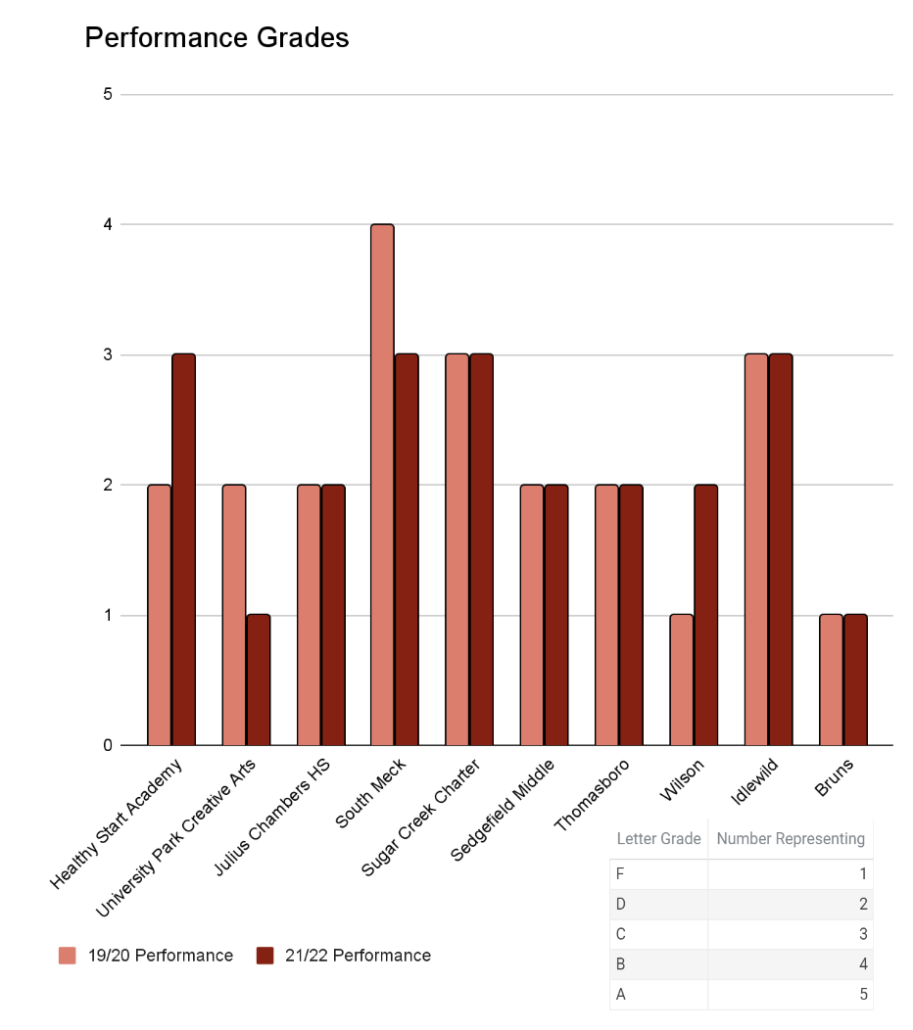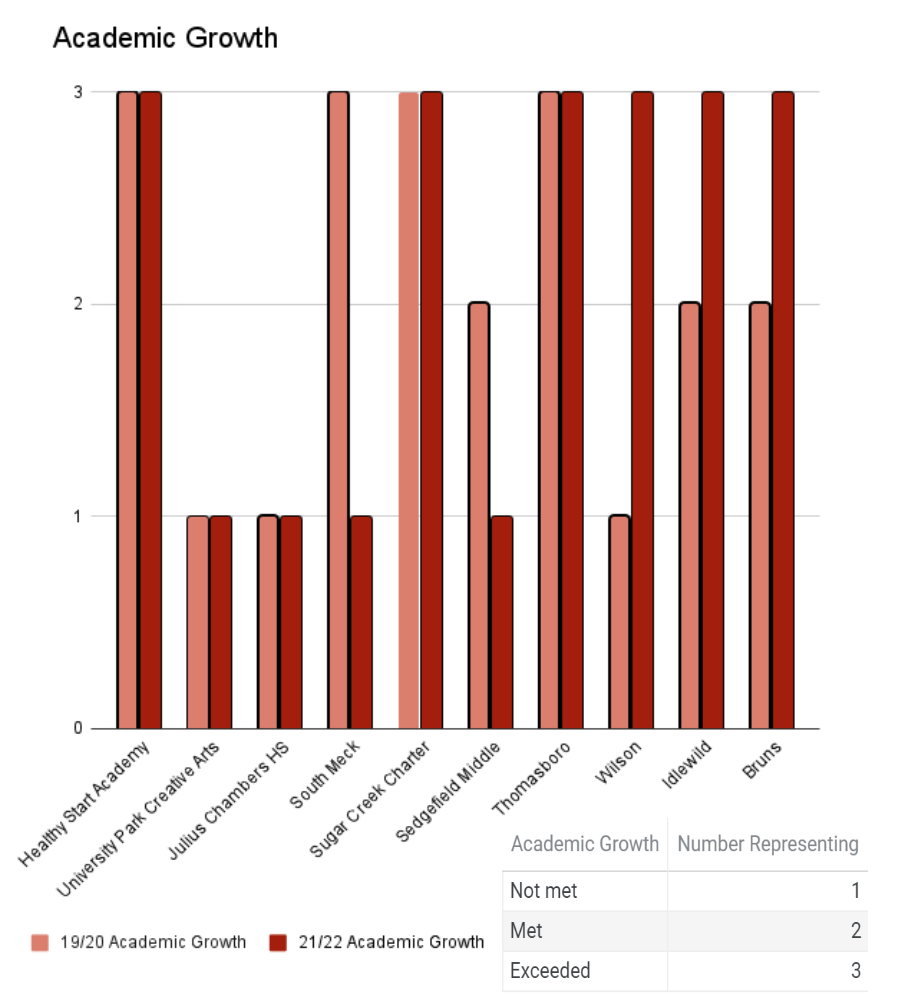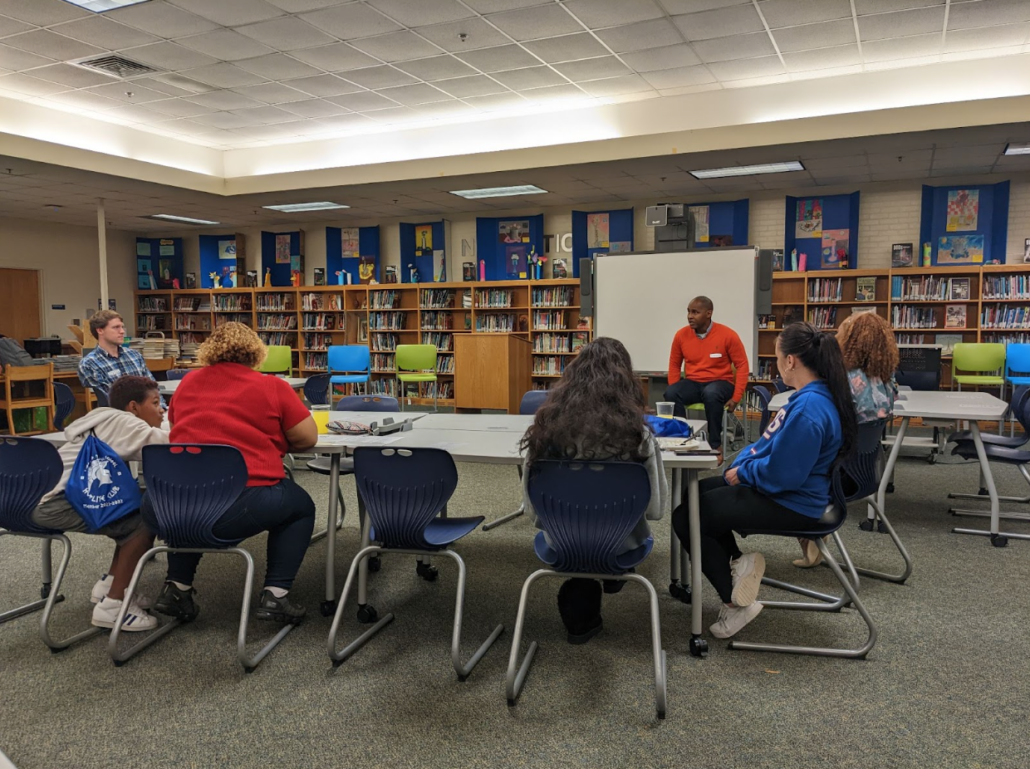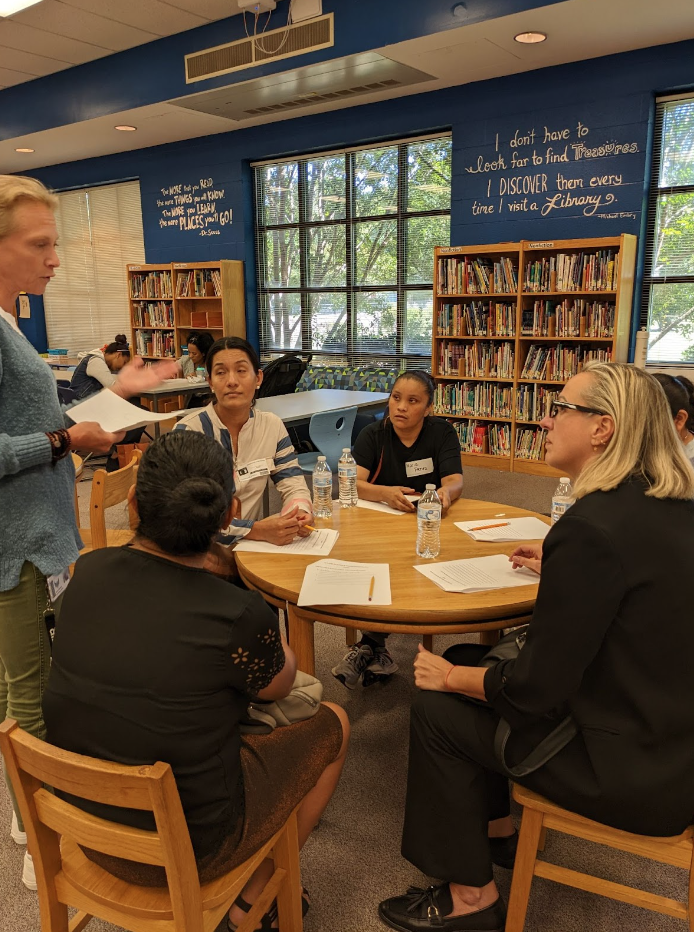#80 – Family Empowerment Leads to Positive School Performance Outcomes
Written by Jia Lin-Bothe, Director of Family Empowerment
Research done by Zoe Shellenbarger, Family Empowerment Intern
We’ve tracked our partner schools through the family empowerment work from the 2021-2022 school year to understand academic trends, and here are some promising results from our partner schools:
- Wilson STEM Academy did not meet academic growth in 2019-2020, and exceeded academic growth in 2021-2022.
- Idlewild Elementary School met academic growth in 2019-2020, and exceeded academic growth in 2021-2022.
- Bruns Avenue Elementary School met academic growth in 2019-2020, and exceeded academic growth in 2021-2022.

- Healthy Start Academy (now Durham Charter School) increased 19% in Reading proficiency (from 33.8% in 2020-2021 to 52.8% in 2021-2022), 32.4% in Math proficiency (from 27% in 2020-2021 to 59.4% 2021-2022) and 36.1% in Science proficiency (from 56.8% in 2020-2021 to 92.9% in 2021-2022).
- Movement School Freedom increased 10.8% in Reading proficiency (from 31% in 2020-2021 to 41.8% in 2021-2022) and 25% in Math proficiency (from 21.3% in 2020-2021 to 46.3% in 2021-2022).
- Sedgefield Middle School increased 8.8% in Reading proficiency (from 37.9% in 2020-2021 to 46.7% in 2021-2022), 13.5% in Math proficiency (from 32.8% in 2020-2021 to 46.3% in 2021-2022), and 21.7% in Science proficiency (from 37.2% in 2020-2021 to 58.9% in 2021-2022).
- Thomasboro Academy increased 6.4% in Reading proficiency (from 19% in 2020-2021 to 25.4% in 2021-2022), 16.3% in Math proficiency (from 10.8% in 2020-2021 to 27.1% in 2021-2022) and 22.2% in Science proficiency (from 32.6% in 2020-2021 to 54.8% in 2021-2022).
- Sugar Creek Charter School increased 6.1% in Reading proficiency (from 42.3% in 2020-2021 to 48.4% in 2021-2022), 17.9% in Math proficiency (from 25.9% in 2020-2021 to 43.8% in 2021-2022), and 10.9% in Science proficiency (from 66.1% in 2020-2021 to 77% in 2021-2022).

Research has shown that family engagement can positively impact a student’s academic performance. Families’ involvement in their children’s education can increase academic achievement, motivation, and well-being. Here are a variety of ways that schools can support families’ engagement and empowerment, including:
- Providing information and resources: Schools can provide families with information and resources to help them understand their children’s learning and development and support their children’s learning at home.
- Our family empowerment initiatives with schools bring resources for families to better support their children and themselves. We’ve been helping families with their economic mobility journeys through resources such as financial education, job training and opportunities, housing assistance, and more.
- When families have access to information and resources to help them understand their children’s learning and development, they can better support their children’s academic progress. For example, suppose a school provides families with information about each grade level’s curriculum and learning goals. In that case, families can better understand what their children are learning in school and how they can support their learning at home.
- Connecting families to community resources can help to provide additional support for students’ learning and development. For example, when a school connects families to local libraries, afterschool programs, and summer programs, it can provide students with additional opportunities to learn and grow outside the classroom.
- Connecting families to community resources can promote the empowerment of adults. When adults feel connected to and supported by their community, they feel more confident and capable in their roles as parents and caregivers. This, in turn, can lead to parents’ and caregivers’ increased involvement in their children’s education and overall well-being.
- During events like Back to School and Curriculum Nights, we helped schools bring resources for families, such as books for students, and hosted community resource fairs for families to learn more about free resources within their neighborhoods.

A family empowerment night at Sedgefield Middle School for families to hear about the importance of parents and caregivers building relationships and getting to know their students on a deeper level.
- Encouraging participation: Schools can create opportunities for families to participate in their children’s education, such as through parent-teacher conferences, open houses, and other school events.
- We utilize a comprehensive pre-survey at the beginning of the school year, sent out to all students to take home to their families. This survey allows us to find the best days and times for our partner schools to host events and the resources families would like to see from their students’ schools.
- We encourage schools to utilize the 10×5 communication strategy by pushing communication out at least ten days before an event and making at least five touchpoints.
- At the end of our events, we use an Exit Survey to collect family feedback to improve the program.
- We work with our school partners to set attendance goals at family-focused events. By doing so, teachers and students can encourage their families to attend school events. This could look like a friendly competition across different grade levels and/or homerooms.
- Building relationships: Schools can work to build positive relationships with families and encourage open communication, which can help families feel more comfortable and involved in their children’s education.
- We encourage our school partners to communicate regularly with families and to keep families informed about their student’s progress, upcoming events, and any changes to school policies. This can be done through newsletters, phone calls, or email.
- It is important to involve families in the decision-making process. As part of our partnership with schools, we form a Family Empowerment Committee (or something similar) of families and staff to drive the family empowerment work and to invite conversations and qualitative anecdotes from families further. This group meets monthly to review family-related data and to plan for events. This helps families foster a sense of ownership and investment in the school community.
- The family empowerment events we co-host with schools are often focused on educational workshops for families. By doing so, families can learn more about specific topics they’ve requested support in (as identified through the pre-surveys).
- Often, when these workshops are centered around financial literacy or physical wellness, teachers can also participate as participants. It is powerful for families to be in the same learning space as teachers. Teachers and families can share ideas and experiences, and everyone can learn from each other and form supportive networks, thereby creating more profound connections.
- It is also essential for schools to foster a welcoming and inclusive environment. This includes providing translation and interpretation services.
- Through our family empowerment model, we’re able to collect and analyze surveys from families, and form a Family Empowerment Committee at each of our partner schools. From these and other interactions, we’ve seen that families are more likely to engage with their students’ schools as more trust is built.

A Family Empowerment Committee meeting at Idlewild Elementary School where families are providing qualitative feedback to how the school can better support student learning.
- Offering support: Schools can provide support to families through counseling, tutoring, and other resources to help them navigate challenges and support their children’s learning and development.
- When families have relationships with individual teachers or school administrators, they are more likely to reach out to ask for support.
We’d like to argue that the school’s positive outcomes in performance grades and proficiency growth correlate to strong family partnerships. When families are invested in their student’s education and have the necessary tools and resources to support their students’ learning at home, performance outcomes thrive. We’re proud of our school partners, especially teachers and school leaders, for meeting and exceeding their goals. We know that many factors influence school performance and success, and having strong family partnerships is just one of these many factors.
Action Item:
- What is your school doing to foster strong family partnerships? Feel free to reach out to our team on how we could support you, your staff, students, and families!

Leave a Reply
Want to join the discussion?Feel free to contribute!